Soviet radio operators in Spain
In July, the 1936 year in Spain began a civil war. On July 17-18, part of the country's armed forces raised a military insurgency. The Nazis came to the aid of the Franco-Germans - Italy. These countries began to supply the government of Franco not only weapon and equipment, but also whole military units. The armed intervention of the fascist states in the internal affairs of Spain dramatically changed the situation inside the country.
The Soviet Union defended the Spanish Popular Front, which is fighting the rebellious general Franco’s pro-fascist regime. Our country demanded urgent measures from the League of Nations to curb the insurrection. However, the international agreement on non-interference in the Spanish events has in fact become a means of supporting Francois. In the current situation, the Soviet government decided to satisfy the request of the Republican government to sell weapons, send military experts as advisers to the Republican army and assist in the training of pilots, tank crews, and artillerymen. The main flow of goods to Spain went through the Black Sea ports and partly from Murmansk and Leningrad.
From autumn 1936 to January 1939 the republican army received from our country 648 aircraft, 347 tanks, 60 armored vehicles, 1186 guns, 20 486 machine guns and 497 813 rifles.
Order 3000 Soviet volunteers (military advisers, pilots, sailors, tankers) fought on Spanish soil. To ensure the work of military advisers and specialists, as well as coordinating the management of maritime transport, which were to transport cargo to Spain, it was necessary to ensure radio communications. The task was difficult. For this, it was necessary to quickly create radio centers in Moscow and Cartagena, and all ships sent from the Soviet Union should be equipped with appropriate radio equipment capable of providing two-way communication on the entire route.
The practical implementation of these tasks was assigned in Moscow to the Separate Radio Division of the People's Commissariat of Defense (ORD NKO). Several transmitters with power from 0,5 to 15 kW were installed on the transmitting center. By the beginning of November 1936, the OSA NKO already maintained constant communication with the radio station of the main military adviser of the Soviet Union in Republican Spain, Y.K. Berzin. In fact, it was not a radio station, but a radio center, as from its equipment and the number of radio operators it could provide radio communication not only with Moscow, but also with several correspondents in Spain itself. A.N. was appointed the head of the radio center. Makarenko, who organized it.
When creating the ORD of NPOs, perhaps one of the main difficulties was the selection of the cadre of radio operators and engineering and technical workers both for work in Moscow and for transport sent to republican Spain. At that time there was not a sufficient number of diverse and well-trained signalmen. Personnel were selected from the Red Navy, the merchant sailors fleet, amateur shortwavemen, signalmen of the ground forces and graduates of military schools and academies. Most of the selected specialists were not trained to carry out the intended work. Therefore, almost all of them received additional training at the ORD of NPOs, and then, depending on their specialty, desire and state of health, they were either left to work in the radio division or sent to Spain.
Immediately the question arose of creating a communication system, since it turned out that it was impossible to use any one of the existing communication systems used in the armed forces, the People's Commissariat of Communications or the People's Commissariat of the Navy for the upcoming tasks. Soon we managed to create our own, very flexible and reliable system, which included useful elements from all communication systems. By the middle of 1937, she acted flawlessly.
Transports, sent from the Soviet Union to Spain with weapons and other military goods, were conventionally called "players" (for example, "Y-1", "Y-2", etc.). The first of these were the Soviet ships "Komsomol", "Kursk", "Zyryanin", "Chicherin" and others. They had to communicate short-wave transmitters, tuned only to one wave of the marine range - 48 m. Working with them OSD turned out to be very difficult, because, firstly, this range was heavily loaded; secondly, when transports were removed over a distance of more than 1000 km, communication had to be held only in the dark of the day, since during the day these waves did not pass. And although radio transmissions were delayed, there was no communication breakdown with any of the vessels.
When Spanish ships were involved in the transportation of goods, the matter became more complicated, since they did not have shortwave radio stations on board. At that time, our industry had not yet produced commercially necessary power stations. Therefore, to speed up the solution of the issue, a special group of specialists was created, which quickly designed and manufactured about a dozen simple radio transmitters with self-excitation with a power of 30-100 watts. Power was supplied from the batteries through the humormer. Radio transmitters were attached to shortwave receivers of the type "KUB-4".
Equipped with such transmitters, after the Soviet courts went and the Spanish "games". Two of our radio operators were sent to every Spanish transport with the expectation of round-the-clock watch. Installation of equipment on ships took only a few hours. Soon, however, it became clear that radio transmitters have serious flaws.
Creating a new radio equipment was assigned to another group of highly qualified specialists. For two weeks, they manufactured five new 100-watt transmitters that operated with quartz (i.e., on a fixed wavelength) and in a smooth range. However, tests have shown that only well-trained radio operators can work on these transmitters. In this regard, the specialists were instructed to simplify and facilitate the transmitter, without reducing its good qualities. As a result, a new (third) type of transmitter “A-19” with a capacity of about 30 W appeared, which received good reviews. It was made in large series and installed on all subsequent transports, and during the years of the Great Patriotic War "A-19" found wide application in the radio centers of the partisan movement headquarters.
To ensure the successful transition of transports, a special route was developed for each of them, in such a way that dangerous areas pass at night and stay away from the coast and those places from which the greatest threat from the Nazi side was expected aviation and submarines. At the same time, various camouflage measures and actions in case of meeting with enemy ships were also provided.
After the release of the next ship from Sevastopol, the radio operators set up a round-the-clock watch. ORD NKO monitored communication sessions held 2-4 times per day with each transport. In addition, round-the-clock monitoring was also carried out at duty frequencies in case of an urgent connection with the “players”. Approximately two days before the approach to the coast of Spain, usually at the Tunisian Cape of Bon, communication with the base of the Republican fleet was established. The entire transition from Sevastopol to Cartagena continued, depending on the type of vessel, 5-8 days, the latter of which was transported under the escort of Republican ships. Radio communications were particularly important on the most dangerous part of the transport route, from the coast of North Africa to Cartagena. The order of the meeting with the convoy was discussed on the radio. When approaching the meeting place, a radio connection was established with the flagship, usually with the cruiser “Libertad”.
At the port of destination, radio operators together with the radio equipment removed were sent to Valencia at the disposal of the main military adviser, where they were assigned to various fronts or radio centers of the main advisers. Thus, the advisers were able to keep in touch not only with the main military adviser in Valencia, but also a direct connection with Moscow, and at any time of the day.
The first Soviet radio station appeared in Cartagena in November 1936, when the senior radio operator AP Perfilyev arrived there on the Spanish ship Cabo de Palo (Y-10). At the direction of the Chief Marine Adviser N.G. Kuznetsova, he stayed in the city and provided a reliable connection with Moscow. At the beginning of May 1937, the highly skilled radio specialists L. Dolgov and S. Litvinov were delivered on the ship “Ciudad de Cadiz”. During a difficult voyage, they securely provided communication. In Cartagena L.V. Dolgov was appointed head of the radio station (hub) of the main sea adviser and was instructed to improve the radio communication system. This work, he, together with A. P. Perfiliev, completed in a short time. They replaced the radio station with a more advanced one, which allowed to keep uninterrupted communication with the Center, advisors on ships, and transports that arrived from the Soviet Union. After three months of work in Cartagena L.V. Dolgov, at the direction of the Center, replaced the head of the radio station in Valencia, A.N. Makarenko, who was descending to the Soviet Union. And the head of the radio station at the main naval adviser was O.G. Tutorial.
Soviet telecommunications operators also provided combat operations in which our advisors took part. So, L.V. Dolgov recalled with me: “One of the most memorable events of the summer of 1937 for the Soviet volunteers was the Brunet operation to defend Madrid. In her republican command, in addition to the defense of the capital, set the task to thwart the fascist attack on Santander. The enemy was already on the outskirts of the city when the group of the main military adviser G.M. Sterna arrived at this section of the front. On his instructions, we launched our marching radio station and quickly established radio communications directly with the Center. The work had to be carried out with the continuous raids of enemy aircraft. However, despite the complexity of the situation, our radio station fully fulfilled the task of ensuring uninterrupted radio communications. Information was transmitted without delay, although it was often necessary to change the station's stationing, right up to its placement in the drainpipe laid under the road. After the completion of the operation on the Central Front, there was a lull. Radio operators for the uninterrupted communication in this operation were highly appreciated by the chief adviser. ”
Soviet radio operators sometimes had to perform their duties under very difficult conditions, but despite this, they kept a steady connection. For example, when, since November 1936, the rebels intensified the bombardment of Cartagena from the air, the antennas often failed, the power supply to the radio stations was stopped. However, the connection has never been broken. Signalers have always had an emergency power supply, and if the antennas were damaged, they were quickly restored.
The radio operators, who provided communications for advisers on the ships of the republican fleet, participated in many fleet combat operations and, to the best of their abilities, provided assistance in solving the tasks at hand. For example, in July 1937 of the year, the Republican destroyer Almirante Valderes was guarded near the coast of Spain by a Greek steamer carrying a weapon stranded on the shores of the USSR. During the emergency unloading of the steamer, a Nazi aircraft appeared. The destroyer fire anti-aircraft machine guns and guns kept him at a considerable distance. But the enemy still dropped bombs near the ship, and then the destroyer fired at a dive. A second bomber flew in to replace it. The Soviet radio operators I. Berland and I. Yakoyev, who were on the destroyer, did not have a connection with the airfield of fighter aviation. However, they managed to call the aircraft through the radio center of the main military adviser. When our I-16 appeared in the sky, the bombers quickly retreated and did not appear again.
Radio operators O. Tutorsky and S. Litvinov on the cruiser “Libertad” and G. Epishev on the destroyer “Almirante Apteker” participated in the 7 March 1938 sea battle, as a result of which one of the best Francoist ships was sunk - the cruiser Baleares.
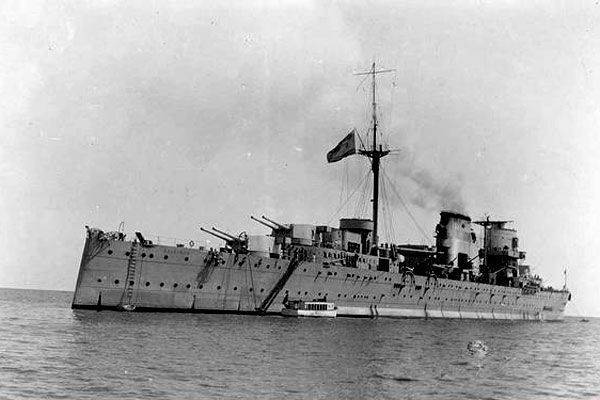
The head of the radio station of the Chief Marine Adviser, Oleg Tutorsky, recalled: “Our advisers in the fleet, apart from participating in combat operations, paid great attention to the organization and conduct of combat training and exercises. We, radio operators, also improved communication. As a result, our relationship has become searchless. The use of fixed frequencies in day and night hours allowed to work without long calls and callsigns. During the hikes, the radio stations on the ships and on the base were “at the reception” all the time - it was enough to turn on the transmitter and press the key 2-3 once, as the correspondent immediately acted. They worked at separated frequencies and, using separate antennas on the transmitter and receiver, could use half duplex, i.e., when transmitting radiograms, to make interruptions to query unclear places. Such a system was used on almost all of our radio stations, which significantly increased the efficiency and speed of transmission of the material. ”
The Spanish Radio also helped in unforeseen cases. Thus, the radio operators Mikhail the Girl and Nikolai Wernik, going to the USSR on the Magellanes ocean liner, agreed with the radio center in Cartagena about communication on the first day of the journey. For this, they were given a communication program. Magelanes escorted to the African coast by the destroyer Alcala Galliano. At night it became known that the Spaniards had lost contact with the destroyer. Then the radio operator A.P. Perfiliev contacted the radio operators, the passengers of the Magelanes, and established the reason for the lack of communication. It turned out that at night the Magelanes collided with the destroyer escorting it, which almost sank. Thanks to this radio communication, it was possible to quickly organize rescue work. The destroyer, who received a large hole, was towed to Cartagena, and the airliner did not even have dents. A few days later he again went to the Soviet Union.
The vast majority of radio volunteers who worked in Spain had good qualifications and performed their duties perfectly, working on 18-20 hours a day, in a combat situation, often under artillery and machine-gun fire, aerial bombings. Radio operators and all passengers and crew members of the ships during the passage through the Mediterranean Sea were subjected to no less danger. Fascist warships (mainly Italian and German) repeatedly attacked the transports. So, in October 1936, the ships Dnestr, Soyuz Vodnikov, and the Second Five-Year Plan were attacked, and in January of the following year, the Franks seized the steamer Smidovich. From October 1936 to July 1937, the Franco and their allies detained 96 from the Soviet courts, three of which sank.
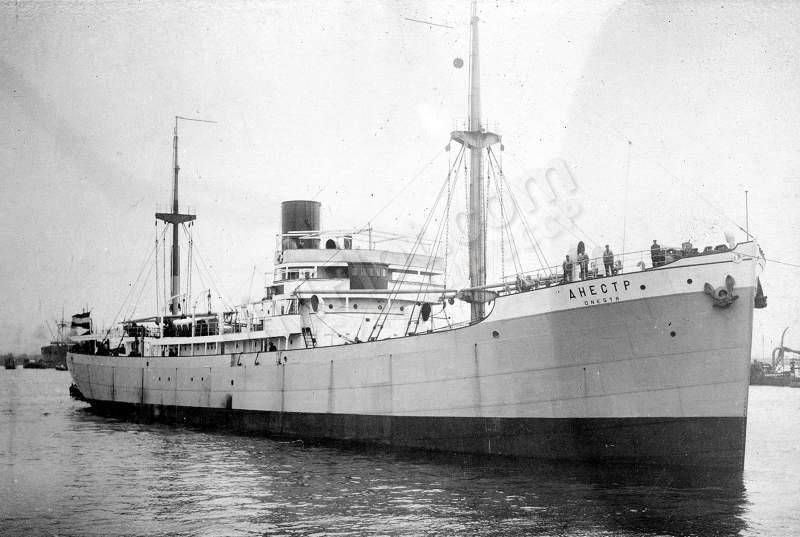
High skill showed radio operators ORD NKO, who worked in Moscow. It took a lot of art in receiving radiograms during the "walking of the waves", especially when the correspondents had transmitters with self-excitation, as well as at the lowest levels of hearing. Maintaining round-the-clock reliable radio communications Moscow - Spain at a distance of more than 3,5 thousand km with radio transmitters with a maximum of 30-100 W and with the level of radio equipment systems of that time is not easy. True, in Moscow there was one relatively powerful transmitter (15 kW), which was used for difficult connections, and there were no restrictions on the choice of operating frequencies at that time. All this helped to maintain reliable round-the-clock radio communication.
12 March 1939, the last group of Soviet volunteers left Spain. During the Great Patriotic War, the cadres of radio operators who gained experience in Spain became the “golden fund” of our army. The absolute majority of them, having received additional training, fought with German fascism in the rank of senior officers of the Soviet Army and Navy.
Sources:
Boltunov M. Achilles heel intelligence. M .: Gaia, 1999. C. 37-42.
Rybalkin Y. Operation "X". Soviet military aid to Republican Spain (1936-1939). M .: AIRO-XX, 2000. C. 56-63.
Artemyev I. Soviet radio operators in the war in Spain // Militaryhistorical magazine. 1976. No. 7. S. 58-62.
Galán H. Memoirs of a Spanish Officer // Military History Magazine, 1981, No. XXUMX. C. 7-72.
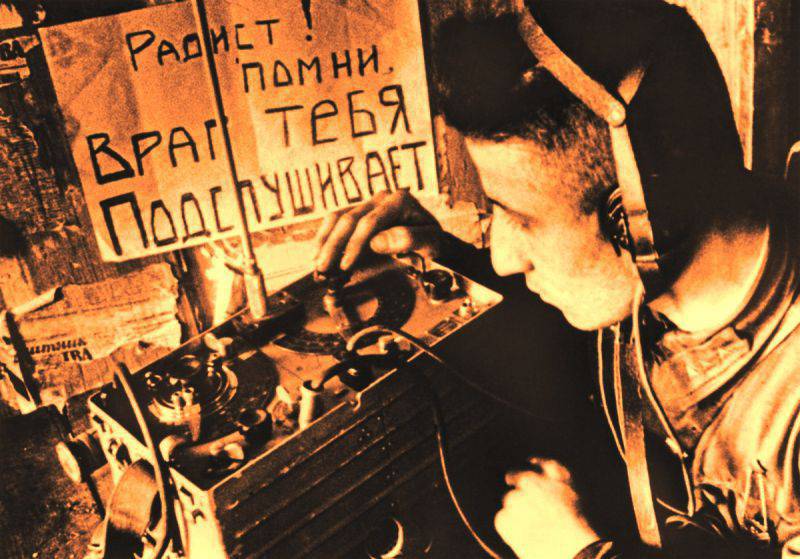
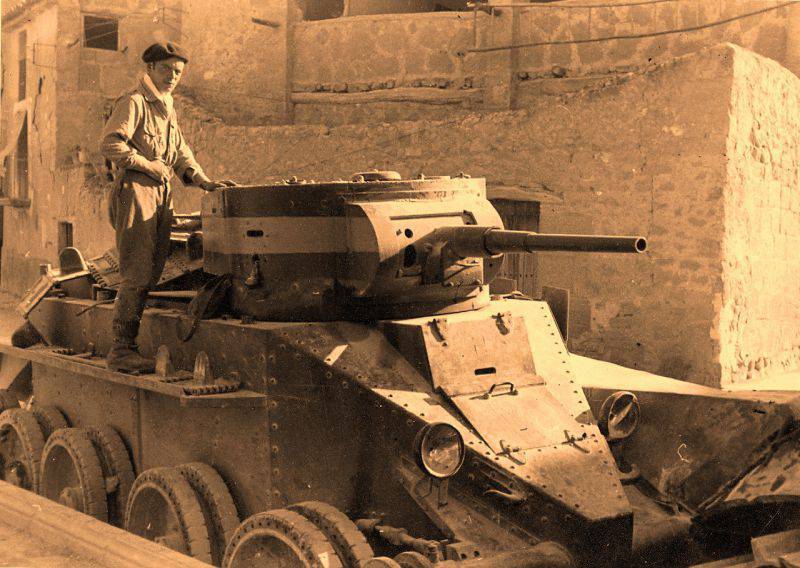
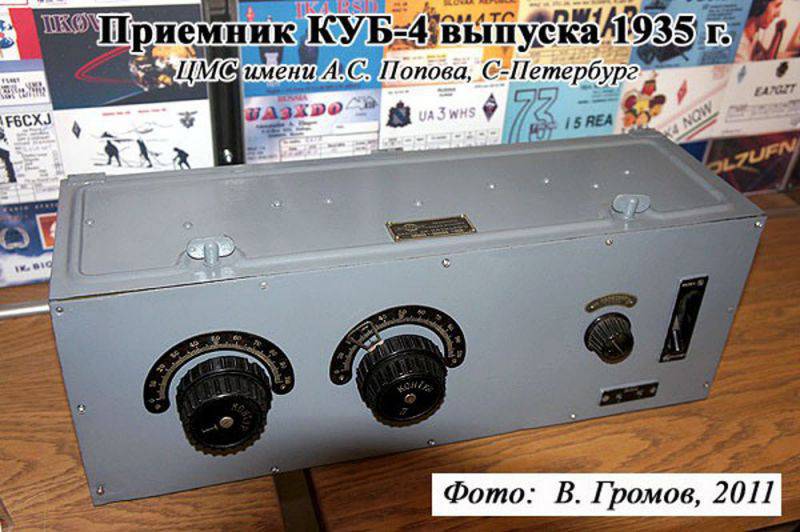
Information